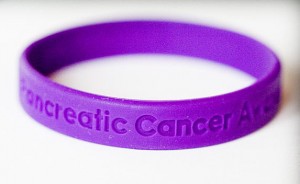Sources: National Cancer Institute; National Institutes for Health
 PANCREATIC cancer will kill 38,460 of the 45,220 people who are diagnosed with it in 2013 in the US. Pancreatic cancer is a disease in which malignant (cancer) cells are found in the tissues of the pancreas. Also called exocrine cancer. The pancreas makes pancreatic juices. These juices contain enzymes that help break down food. The pancreatic juices flow through the main duct to the duodenum, the first part of the small intestine.
PANCREATIC cancer will kill 38,460 of the 45,220 people who are diagnosed with it in 2013 in the US. Pancreatic cancer is a disease in which malignant (cancer) cells are found in the tissues of the pancreas. Also called exocrine cancer. The pancreas makes pancreatic juices. These juices contain enzymes that help break down food. The pancreatic juices flow through the main duct to the duodenum, the first part of the small intestine.
The pancreas is also a gland that makes insulin and other hormones. These hormones enter the bloodstream and travel throughout the body. They help the body use or store the energy that comes from food. For example, insulin helps control the amount of sugar in the blood.
Studies have found the following risk factors for cancer of the pancreas:
- Smoking: Smoking tobacco is the most important risk factor for pancreatic cancer. People who smoke tobacco are more likely than nonsmokers to develop this disease. Heavy smokers are most at risk.
- Diabetes: People with diabetes are more likely than other people to develop pancreatic cancer.
- Family history: Having a mother, father, sister, or brother with pancreatic cancer increases the risk of developing the disease.
- Inflammation of the pancreas: Pancreatitis is a painful inflammation of the pancreas. Having pancreatitis for a long time may increase the risk of pancreatic cancer.
- Obesity: People who are overweight or obese are slightly more likely than other people to develop pancreatic cancer.
Early cancer of the pancreas often doesn’t cause symptoms. When the cancer grows larger, you may notice one or more of these common symptoms: Dark urine, pale stools, and yellow skin and eyes from jaundice; Pain in the upper part of your belly; Pain in the middle part of your back that doesn’t go away when you shift your position; Nausea and vomiting; and stools that float in the toilet.
Advanced cancer may cause these general symptoms: Weakness or feeling very tired; Loss of appetite or feelings of fullness; Weight loss for no known reason
At this time, cancer of the pancreas can be cured only when it’s found at an early stage (before it has matastasized or spread) and even then, only if surgery can completely remove the tumor. For people who are not surgical candidates or who are diagnosed late, the only treatment is palliative.
The Lewis Law Firm has a long history of representing people with pancreatic and other cancers, and their families in Philadelphia and New Jersey. If you or a loved one have been diagnosed with pancreatic cancer which was misdiagnosed or diagnosed late, contact the Lewis Law Firm for a FREE consultation and review of your case, today.
